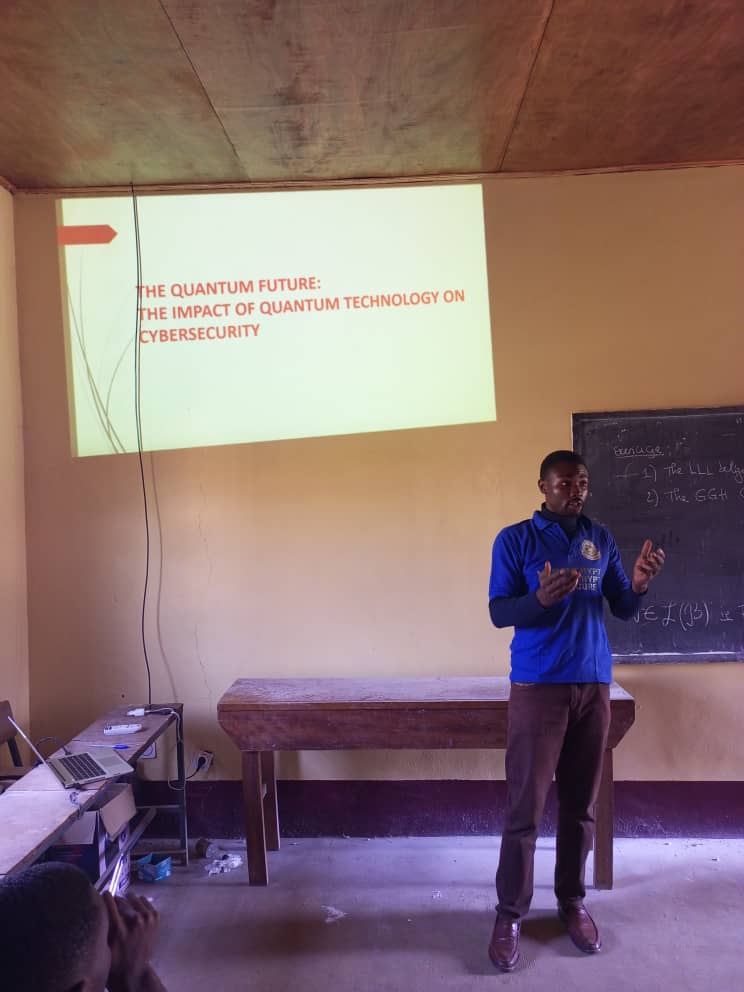The Quantum Future: The Impact of Quantum Technology on Cybersecurity
- 04 Jan, 2024 - 04 Jan, 2024
- 04 Jan, 2024
- Cameroon, Bamenda

Event Description
A student of the Centre for Cybersecurity and Mathematical Cryptology presented on Thursday 4th January 2024 at the student weekly seminars on the topic The Quantum Future: The Impact of Quantum Technology on Cybersecurity.
NOVALLA FONJIH DEREK start by telling that In recent years, quantum technology has emerged as a promising field with the potential to revolutionize various industries, including cybersecurity. As traditional encryption methods face increasing vulnerabilities due to the rapid advancement of computing power, quantum technology offers a new paradigm that could enhance the security landscape. In this post, he will explore the impact of quantum technology on cybersecurity and discuss its implications for the future.
👉🏾The Threat to Current Cryptography:
Current cryptographic systems, such as RSA and ECC (Elliptic Curve Cryptography), rely on the computational difficulty of certain mathematical problems to ensure security. However, the development of quantum computers, with their ability to perform complex calculations exponentially faster than classical computers, poses a significant threat to these encryption algorithms. Quantum computers have the potential to break commonly used cryptographic protocols, rendering sensitive data vulnerable.
👉🏾Quantum Key Distribution (QKD):
Quantum Key Distribution is a revolutionary cryptographic technique that leverages the principles of quantum mechanics to securely exchange encryption keys. Unlike traditional methods, QKD uses the laws of quantum physics to detect any eavesdropping attempts, ensuring the confidentiality and integrity of transmitted data. QKD offers a quantum-resistant solution for secure key exchange, making it highly promising for future cybersecurity applications.
👉🏾Post-Quantum Cryptography:
To mitigate the risks associated with quantum computing, researchers have been actively developing post-quantum cryptography (PQC). PQC aims to design cryptographic algorithms that are resistant to attacks from both classical and quantum computers. Various approaches, such as lattice-based, code-based, and multivariate-based cryptography, are being explored to develop robust encryption algorithms that can withstand quantum attacks.
👉🏾Quantum-Safe Cryptographic Solutions:
Apart from QKD and PQC, other quantum-safe cryptographic solutions are being explored to address the impending threat of quantum computers. These include hash-based signatures, quantum-resistant hash functions, and symmetric key algorithms designed to withstand attacks from both classical and quantum adversaries. Implementing these quantum-safe solutions is crucial to ensure the security of existing systems in the transition to a post-quantum era.
👉🏾Quantum Computing for Security:
While quantum computers pose a threat to traditional encryption, they can also be harnessed to enhance cybersecurity. Quantum algorithms, such as Shor's algorithm, can be used to break cryptographic systems, but they can also be utilized to improve security by developing new encryption techniques and protocols. Quantum machine learning and quantum random number generators are examples of quantum technologies that can enhance the security of data and systems.
the quantum future holds both challenges and opportunities for cybersecurity. With the advent of quantum computers, traditional cryptographic systems face vulnerabilities, necessitating the development and adoption of quantum-resistant encryption methods. Quantum Key Distribution and post-quantum cryptography offer promising solutions to secure communications in the quantum era. Furthermore, leveraging quantum technologies can lead to the development of novel security solutions. As we move forward, collaboration between researchers, industry experts, and policymakers will be crucial to ensure a secure quantum future.

